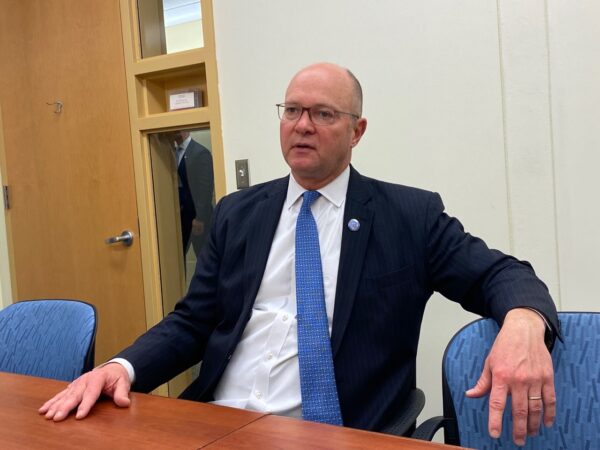Harford email incursion has other counties talking about limits

An intra-party row over emails in Harford County has the leaders of county councils around the state considering what limits can be placed on access to legislative branch communications.
Harford County Executive Robert Cassilly and senior executive staff members are the subject of a complaint to the Office of the State Prosecutor for accessing the emails of at least one councilmember and other officials. And while the legality of the action is yet to be determined, council leaders in other jurisdictions are watching. Many said few, if any, protections are in place to prevent an executive from a sneak and peek review of council emails.
“There are two types of people in this world: those who will touch the stove to learn that it’s hot, and then those who watch someone scream when they touch the stove and learn that it’s hot,” said Democratic Councilmember Peter Smith, chair of the Anne Arundel County Council. “Hopefully we can be that county government that sees these things going on in this other jurisdiction, and then kind of implement, or at least look into, best practices that can ensure it doesn’t actually happen here in our county.”
Harford County, eight other counties and Baltimore City have separate legislative and executive branches.
At least eight councils share email services with their respective executive branches. Officials in Baltimore City and Wicomico County did not respond to requests for information or comment. All county officials that did respond said their county lacked any policy or law limiting executive access to council emails, or that they were unaware of rules setting those limits.
The case involving Cassilly and his council raises several nuanced issues: the privacy of government emails; the reach of the Maryland Public Information Act; the separation of powers of each branch of government; and legal and ethical questions.

Harford County Executive Robert Cassilly (R) chats with reporters Dec. 5 after swearing-in ceremony at Harford Community College. Photo by William J. Ford.
The email kerfuffle is complex. It involves accusations of budgetary improprieties. There’s also a schism among Republicans, with one faction supporting the executive and another supporting Harford County Sheriff Jeff Gahler.
“From just the sheer political aspect of this, it stinks to high heaven,” said Todd Eberly, a political science professor at St. Mary’s College of Maryland. “It doesn’t matter if it’s illegal. The question oftentimes comes down to whether or not something is simply ethical or appropriate.”
Cassilly is in his first six months as Harford County executive.
In May, Cassilly was embroiled in a conflict with Gahler over the county executive’s decision to slow the pace of funding for a training center for the sheriff’s department.
Additionally, Cassilly was accused by Councilman Aaron Penman (R) of sidestepping council approval and transferring $7 million in the fiscal 2023 budget.
Last week, Penman, a retired veteran of the Harford County Sheriff’s Department, announced that Casilly had ordered top aides to search his email, something the council learned through a leaked email.
An email leaked to the council showed the county human resources director had asked the head of the Office of Information Technology to search Penman’s email looking for exchanges between Gahler, Erik Robey, who is director of legislative affairs for the sheriff’s department, Glassman, and Joseph Snee, a Harford County land use attorney, and Melissa Lambert, director of legal affairs for the sheriff’s office.
Cassilly called it an investigation into Penman’s allegations, but to some it appears as if the executive was trying to identify executive branch employees who might be leaking information to the council.
Penman’s complaint has been forwarded to the Office of the State Prosecutor, which investigates misconduct by public officials in Maryland.
Penman has called for Cassilly and others involved to take a leave of absence until an investigation is complete.
Cassilly denied monitoring or intercepting messages. The search — which occurred without notifying Penman or others — was legally permissible because the system is operated and managed by the county on government servers, he said last week.
“The examination conducted was appropriately limited in order to provide the level of confidentiality necessary to support an effective investigation of an alleged misuse of county funds,” Cassilly’s email said.
Eberly said the explanation “lacks justification.” He called the search “despicable.”
“It smacks of somebody said something mean about me and I want to know what else they might have said,” he said.
“If email had existed in the age of Nixon, the plumbers would not have broken into the Watergate to wiretap, they simply would have hacked into email servers,” Eberly said.
Andrew Alperstein, a Baltimore criminal defense attorney, said it’s not entirely clear if a law was broken.
“An email that is on the server of an employer is not private from the employer, that is the answer,” said Alperstein. “So, the only nuance here is because the legislative branch of Harford County’s government is supposed to have independence, what does that mean in the context of criminal law? The answer is that it’s probably not clear. If it’s not clear, it’s probably going to not be criminal because you have due process and that requires you to be on notice of what’s criminal activity here.”
The digital riffling through emails by the Cassilly administration grabbed the attention of councils around the state.
Baltimore County Council Chair Julian Jones (D) said the seven-member council shares an email system with the county’s executive branch.
“It concerns me a great deal,” said Jones.
“The system belongs to the county,” said Jones. “That should not mean that a county executive should be able to just go in and look for anything they want to look for.”
Cost is a primary consideration even among larger county governments.
“We use the county’s email, because of the economies of scale,” said Jones. “It makes sense to use the county email service. It makes sense to do it in terms of economics, but if you have a county executive who decides he wants to rummage through your emails looking for whistleblowers or whatever. It doesn’t really matter what they were looking for. What matters is they went through all of the emails, and saw everything. I don’t know what the criteria was when they were looking but once you open up an email, you see what you see.”
Establishing safeguards or limits on emails between branches of county government is expected to be discussed when heads of local government information technology departments gather in Ocean City at the annual Maryland Association of Counties summer convention next week.
Until recent events in Harford County, several county leaders said they had not worried about the potential.

Montgomery County Councilman Evan Glass
“This seems very Nixonian,” Montgomery County Council President Evan Glass (D) said.
The incident in Harford County may be the first time it has come to the public’s attention in Maryland.
Eight years ago, councilmembers in New Castle County, Delaware faced a similar issue involving Tom Gordon (D), then that county’s executive, and senior county officials. Gordon faced criticism from the council after he and another official released a trove of emails involving the council’s auditor.
Councilmember Janet Kilpatrick (R) said Gordon used state law to justify his review of the auditor’s email.
Kilpatrick, who is still on the council, said the “interpretation of this law is backwards. They thought it gave permission, while it is a section of law that was placed in code to protect employees from employers monitoring their email without notice. Mr. Gordon’s reasoning was that he had to run the County and he always needed to know what people were saying.”
Kilpatrick sponsored legislation limiting access to emails by executive branch officials. The council also considered a separate email server but decided against it because of the costs.
Gordon later vetoed Kilpatrick’s bill. The council was unable to override the executive.
The incident damaged the relationship between Gordon and the county council, said Kilpatrick.
“We tolerated the situation,” Kilpatrick wrote in an email. “Those within the executive branch that could not tolerate what was going on or began to understand that they just had to be ‘yes people’ eventually left for other jobs.”
In Maryland, many officials are only now ruminating on the issue of executive branch intrusions into legislative branch emails.
Glass and others said there was a reliance on everyone listening to their better angels.
“You know, we respect each other’s roles and responsibilities and adhere to state law,” he said. “This is about separation of powers. And if there are disagreements about policies, have public conversations about them. We shouldn’t be snooping in each other’s inboxes.”
The Maryland General Assembly maintains its own email separate from the executive branch. It also has its own staff to administer and maintain the system.
Meanwhile, the situation in Harford County continues to escalate.
Gahler, in a memo to staff and to Cassilly sent last week, said that he was barring any county official at the director level or above to enter a county sheriff’s department facility unescorted. Gahler cited the ongoing investigation.




 Creative Commons Attribution
Creative Commons Attribution